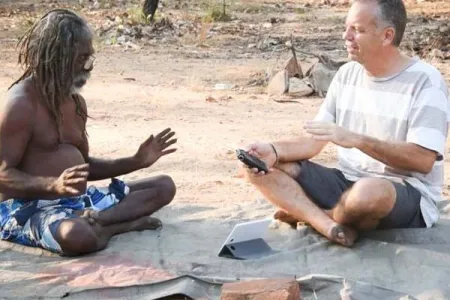Keeping Indigenous languages strong with mobile technologies
The Australian Research Council has awarded Charles Darwin University (CDU) a $322,500 Discovery Grant to explore the use of mobile technologies to support Indigenous and non-Indigenous people working together, and learning each other's languages in the process.
Northern Institute linguist and computer scientist, Professor Steven Bird received the three-year grant in the latest funding round.
Professor Bird has already explored the use of mobile devices in his preliminary work to learn and teach Kunwinjku, the main language spoken in the West Arnhem region.
“The mobile phone helps create a safe space, particularly for young learners. But at the same time, it offers an effective way of recording and memorising useful words and phrases,” he said.
“As part of this work, we will develop apps for managing and sharing recordings of technical vocabulary, in both English and Indigenous languages. The aim is to develop tools to help Indigenous and non-Indigenous people who are working together to communicate more effectively.”
One concept Professor Bird has prototyped involves using the phone to record new words and phrases spoken by an Indigenous person, repeated by a non-Indigenous person and corrected by the original speaker. The recording is tagged and built into a collection that can be learnt and shared to support two-way learning.
Professor Bird said that from both a linguistic and computational perspective, it was better to record than to write.
“Trying to capture language in writing has many weaknesses, whereas what is spoken and recorded on a phone is all in the open. Most importantly, the technology is not getting in the way of understanding the language in its primary, spoken form,” he said.
“Indigenous languages have a long and deep connection to places and things. Language is a means of establishing title to country, yet many languages and dialects are disappearing.
“There were about 250 languages at the time of white settlement yet only about a dozen are still being learnt by children.
“Building pride and recognition for Australia’s first languages, and for the people who are keeping them strong, could yet turn this around,” Professor Bird said.
Better communication between Indigenous and non-Indigenous people is seen as having a positive impact on job creation and improved health and educational outcomes.
“We envisage that these technologies will support more effective collaboration in endangered environments and cultures, supporting communication in areas such as land management, biodiversity monitoring, carbon abatement and rock art conservation,” he said.
